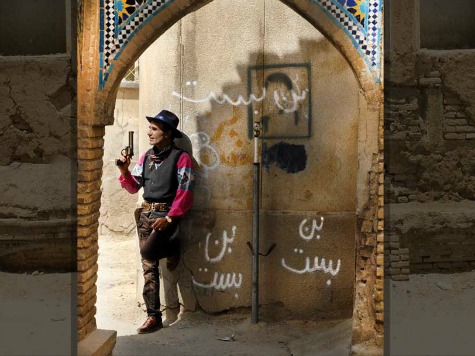Negahdar Jamali is an Iranian filmmaker who has for the past 35 years made American-inspired westerns complete with cowboys and Indians in the deserts surrounding the city of Shiraz.
Poor and illiterate, Jamali has nevertheless dedicated his whole life to making more than 50 movies, often in the face of pressure to give up his dream from family and from the society surrounding him.
He funds the films through working, either wrecking cars at an auto lot with a sledgehammer or by selling costume jewellery from a blanket on the ground.
Then he recruits actors from the streets of Shiraz, convincing local market stall holders to donate feathers — sometimes plucked from live chickens — so he can make the Indian costumes that add a degree of authenticity to his decidedly low budget, B-grade productions.
Jamali’s story has been told in the documentary “My Name Is Negahdar Jamali And I Make Westerns”, which this week was given its world premiere at the Busan International Film Festival in South Korea.
Jamali, aged in his 60s, chose not to attend the film festival due to the distance and worries about cultural differences he might face. The documentary was represented at Busan by its director Kamran Heidari.
At one stage in the film, Jamali says he has been obsessed with westerns since he was a boy, counting the late, great director John Ford (“The Searchers”, “Stagecoach”) as an idol.
Ford’s films — and his own — are about men who try to “remove the blanket of evil from the land,” said Jamali.
While “My Name is Negahdar…” might begin as an oddity it soon evolves into a moving tribute to a man who will let nothing separate him from his art.
While making a production called “The Great Revenge”, Jamali faces mounting bills at home, plus the ire of his wife and young son, and many in the local community who think he should be putting his family’s concerns first.
But he labours on, scraping together just enough money to pay his actors and for film stock. He eventually sees the production to its end and places handmade posters around town next to fading images of Iran’s religious leaders.
When the film premiered on a wall in a local square, an audience of around 20 gathered on carpets in the dirt.
Far from trying to stop Jamali’s work — which might be expected given its American nature and recent animosity between the two nations — the local authorities in Shiraz have begun to recognise Jamali’s contribution to the local community.
The free DVDs, screenings, and the work he gives to his crew of local “actors” have led to the director being handed some small awards, Heidari said.
The fact that the director was illiterate only became apparent halfway through the shooting of the documentary.
Heidari said he hopes other festivals around the world will pick up his documentary and said he had plans to help Jamali box up his films into a DVD collection, with the documentary included as part of the package.
Crucially, Heidari wanted to bring the filmmaker some attention — something Jamali was happy to accept.

COMMENTS
Please let us know if you're having issues with commenting.